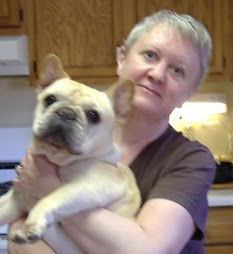Why am I returning to this topic after already addressing it at great length in another post? Because I spent this afternoon engaged in one of those use-every-pot-pan-utensil projects that overtakes me from time to time and have dishpan hands as a result.
We do have a dishwasher. But although our household consists of 10 creatures (7 dogs, 2 humans, 1 cat), we don't use enough dishes to run that thing on a daily basis (I suppose we could run it daily, but I was scarred as a teenager by the grim movie Soylent Green and I worry about running out of water one day). We have duplicate sets of measuring cups, measuring spoons, and other kitchen items, but not enough extras to commit them to the dishwasher for more than one day at a time. So we stick plates, bowls, glasses, flatware, and plastic storage containers (those seem to reproduce at will in the dark, mysterious interiors of the kitchen cupboards, and that reproduction NEVER results in lids to match every container) into the dishwasher and run it every other day, and wash the rest (skillets, saucepans, cooking utensils) by hand.
So I have dishpan hands today, and that reminds me of the days I spent as a slave when living in Scotland in 1970-1971. Not literally a slave, you understand. No one bought me. My parents spent something like $300 on a one-way ticket to fly me to Scotland (apparently hoping that I would never return) and friends of theirs put me to work in their home, estate, garden center and florist business in return for my room and board (at 17, I was too young to get a work visa).
These friends of my parents had employed people (mostly the young friends of their 4 kids) in this way as "slaves" for many years. When I was living there, they employed an older woman, Jolande (my mother's age) and her 19-yr-old daughter as slaves (Jolande's 15-yr-old daughter also lived there but her job was going to school). Jolande had been a professional chef and hotel manager, and she taught me how to cook.We were all encouraged to cook. We had to take turns cooking breakfast every day (Full English Breakfast). Jolande handled the rest of it (hot lunch, afternoon tea, hot dinner) but if you wanted to contribute a dish or a meal at another time, that was OK. Some of us (like me) quickly figured out that cooking lunch guaranteed you a place in a kitchen warmed by a huge coal stove while the others were outside trying to burn piles of wet leaves in the cold Scottish rain.Anyway, one of Jolande's rules was (surprise!): clean up as you go. If you cooked a meal or even one dish (like a batch of scones, or a cake), you were exempt from cleanup. Everyone else had to pitch in and wash dishes. Some of that (china, flatware) happened in a very smart "butler's pantry" with automatic dishwasher next to the dining room, and the rest (saucepans, etc) happened in the scullery. The scullery was a cold, drafty, damp room next to the kitchen. There was a huge sink with cold running water and ribbed, wooden counters that drained into the sink. There were also big bins for storing root vegetables (where rodents liked to explore at night) and hooks and shelves for storing big cooking pans. Having to do dish duty in that scullery in January was no fun. The only thing that didn't have to be washed was the "chip" pan. We fried chips (what Americans call French fries) in the same rendered meat grease over and over again...washing the pan inbetween uses was sacrilege.With this system, it quickly became clear that being a good cook was not necessarily the same as being a beloved cook. We had a slave there for a while (not me!) who would tackle the most complicated recipe you can imagine and produce delightful dishes, but who left every article in the kitchen dirty and waiting for someone else to clean it. (Later I named a dog after that girl - I won't say which dog - I'll just say it wasn't a smart one). At the same time, we had a slave who could barely figure out how to make toast (I'll admit that's tricky when you have to use an oven instead of an electric toaster) but left virtually nothing to be washed afterwards.
About 4 months after I returned from that stay in Scotland (having earned enough money to buy a flight home), I was working as a Mother's Helper for a coworker of my mom's. Her kids were troubled and difficult (for many reasons), especially the oldest (who had been designated as family caretaker when his mom went back to work after her divorce). One day the mom told me to give the boys hamburgers for supper. I made the hamburger patties under the boys' close scrutiny: why was I adding salt and pepper? Worcestershire sauce?! Worcestershire sauce is for grownups! Despite their fears, the boys enjoyed the hamburgers (on store-bought buns, with lots of catsup), but the oldest one supervised me closely when the meal was done. I put the skillet I had used to fry the hamburgers into the sink and filled it with warm water and a few squirts of dishwashing liquid. The boy said suspiciously, "What are you doing?"
"I'm leaving the skillet to soak."
"Why?"
"It will be easier to clean later."
"It will?"
"Yup," I said. "But don't worry about it, because I'll wash the skillet before I go home."
The boy nodded, and I realized he was storing the Clean Up As You Go information away for the next time he had to deal with preparing and cleaning up after a meal.
Thursday, July 9, 2009
Subscribe to:
Post Comments (Atom)








No comments:
Post a Comment